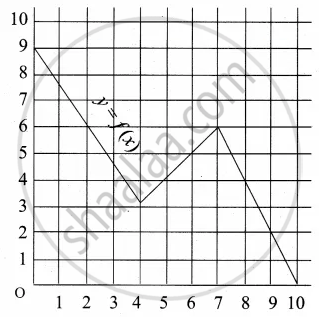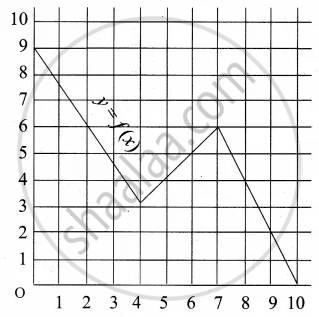Advertisements
Advertisements
Question
Answer the following:
If a2 = b3 = c4 = d5, show that loga bcd = `47/30`
Solution
a2 = b3 = c4 = d5
Taking log to the base a throughout, we get
loga a2 = loga b3 = loga c4 = loga d5
∴ 2 loga a = 3 loga b = 4 loga c = 5 loga d
∴ 2(1) = 3 loga b = 4 loga c = 5 loga d
∴ loga b = `2/3`, loga c = `2/4 = 1/2` and loga d = `2/5`
∴ loga b + loga c + loga d = `2/3 + 1/2 + 2/5`
∴ loga bcd = `47/30`
APPEARS IN
RELATED QUESTIONS
If \[f\left( x \right) = \frac{1}{1 - x}\] , show that f[f[f(x)]] = x.
If \[f\left( x \right) = x^3 - \frac{1}{x^3}\] , show that
If f(x) = loge (1 − x) and g(x) = [x], then determine function:
(i) f + g
If f(x) = loge (1 − x) and g(x) = [x], then determine function:
(iv) \[\frac{g}{f}\] Also, find (f + g) (−1), (fg) (0),
Write the range of the function f(x) = cos [x], where \[\frac{- \pi}{2} < x < \frac{\pi}{2}\] .
Write the range of the function f(x) = ex−[x], x ∈ R.
Let \[f\left( x \right) = \frac{\alpha x}{x + 1}, x \neq - 1\] . Then write the value of α satisfying f(f(x)) = x for all x ≠ −1.
Let f and g be two functions given by
f = {(2, 4), (5, 6), (8, −1), (10, −3)} and g = {(2, 5), (7, 1), (8, 4), (10, 13), (11, −5)}.
Find the domain of f + g
Let A = {1, 2, 3} and B = {2, 3, 4}. Then which of the following is a function from A to B?
Let f(x) = |x − 1|. Then,
Let f(x) = x, \[g\left( x \right) = \frac{1}{x}\] and h(x) = f(x) g(x). Then, h(x) = 1
If f(x) = sin [π2] x + sin [−π]2 x, where [x] denotes the greatest integer less than or equal to x, then
The domain of definition of \[f\left( x \right) = \sqrt{x - 3 - 2\sqrt{x - 4}} - \sqrt{x - 3 + 2\sqrt{x - 4}}\] is
If f(m) = m2 − 3m + 1, find f(0)
A function f is defined as follows: f(x) = 4x + 5, for −4 ≤ x < 0. Find the values of f(−1), f(−2), f(0), if they exist.
A function f is defined as follows: f(x) = 5 − x for 0 ≤ x ≤ 4. Find the value of x such that f(x) = 3
Check if the relation given by the equation represents y as function of x:
2x + 3y = 12
If f(m) = m2 − 3m + 1, find f(−3)
If f(m) = m2 − 3m + 1, find f(x + 1)
Find the domain and range of the following function.
g(x) = `(x + 4)/(x - 2)`
Find the domain and range of the follwoing function.
h(x) = `sqrt(x + 5)/(5 + x)`
Express the following exponential equation in logarithmic form
3–4 = `1/81`
Write the following expression as sum or difference of logarithm
`log (sqrt(x) root(3)(y))`
Answer the following:
If f(x) = 3x4 – 5x2 + 7 find f(x – 1)
Answer the following:
If f(x) = ax2 + bx + 2 and f(1) = 3, f(4) = 42, find a and b
Answer the following:
Let f : R → R be given by f(x) = x + 5 for all x ∈ R. Draw its graph
Answer the following:
If `log ((x - y)/5) = 1/2 logx + 1/2 log y`, show that x2 + y2 = 27xy
Answer the following:
Find value of `(3 + log_10 343)/(2 + 1/2 log_10 (49/4) + 1/2 log_10 (1/25)`
Answer the following:
If `log"a"/(x + y - 2z) = log"b"/(y + z - 2x) = log"c"/(z + x - 2y)`, show that abc = 1
Answer the following:
Find the range of the following function.
f(x) = |x – 5|
A graph representing the function f(x) is given in it is clear that f(9) = 2

Find the following values of the function
(a) f(0)
(b) f(7)
(c) f(2)
(d) f(10)
A graph representing the function f(x) is given in it is clear that f(9) = 2

Describe the following Domain
A function f is defined by f(x) = 2x – 3 find x such that f(x) = 0
If a function f(x) is given as f(x) = x2 – 6x + 4 for all x ∈ R, then f(–3) = ______.
Find the domain of the function f given by f(x) = `1/sqrt([x]^2 - [x] - 6)`
Find the range of the following functions given by f(x) = 1 + 3 cos2x
(Hint: –1 ≤ cos 2x ≤ 1 ⇒ –3 ≤ 3 cos 2x ≤ 3 ⇒ –2 ≤ 1 + 3cos 2x ≤ 4)
Redefine the function f(x) = x − 2 + 2 + x , – 3 ≤ x ≤ 3
The domain and range of the function f given by f(x) = 2 – |x – 5| is ______.
If f: R `rightarrow` R be a function defined by f(x) = 4x3 – 7. Then ______.
